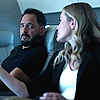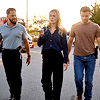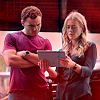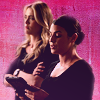multi-fandom post
24/2/26 21:3901-04 the x-files
05-12 starfleet academy
13-16 st voyager + discovery
17-20 sw prequel movies + mandalorian
21-26 fallout
27-31 comics
32-36 misc tv
37-40 movies (eileen, inside out, batman returns)



H E R E
05-12 starfleet academy
13-16 st voyager + discovery
17-20 sw prequel movies + mandalorian
21-26 fallout
27-31 comics
32-36 misc tv
37-40 movies (eileen, inside out, batman returns)



H E R E
Hello, hello
23/2/26 18:16What's up party people?
If you've made it this far you've probably gathered that my name is Brandyn, and yeah I'm testing the waters here. I'm used to social media but never did anything live journal related and definitely don't entirely fit in with capital F Fandom spaces (Though all respect to the queer men, gals, and non-binary pals that spend their time in the trenches and help elevate certain fandoms, I like Star Trek and Gundam, I respect my history).
Mostly want to use this space to post a bit...vulnerably? Not necessarily in terms of my personal life or a place to vent necessarily (Though that's not off the table), but a space removed from the more performative persona I've put on for some other sites (Namely LeagueOfComicGeeks, cause big comic fan. Can find me under fatboyftw there). Not that I'm bitching, I love being known as a snarky but insightful asshole but it can take work to maintain. Alongside the inherent cynicism that having a space only dedicated to one niche hobby inherently brings since once you reach a certain threshold of something and learn how the sausage gets made you tend to get more bitter and critical. I love shouting into the ether about stuff but traditional social media has a way of getting me a bit heated sometimes, lmao.
So I'm going to use this space to be chill and just mainly talk about things I enjoy, comics and otherwise. A place I can go when I wanna post something that on another site I might have to defend or explain a bit more than I have the mental energy to do. As for what I would be posting about well, as we've established comics. Comics of all kinds, love the entire medium, not just superhero stuff. But also the occasional manga/anime, Kaiju Films, video games, and chats about fiction writing since it's not something I do nearly enough but something I love to do.
If any of that seems interesting then feel free to follow...subscribe...whatever it's called here.
(Yes if you check my profile this is just my first post copy and pasted, I realized I didn't have another introduction in me, I'm sowwy)
If you've made it this far you've probably gathered that my name is Brandyn, and yeah I'm testing the waters here. I'm used to social media but never did anything live journal related and definitely don't entirely fit in with capital F Fandom spaces (Though all respect to the queer men, gals, and non-binary pals that spend their time in the trenches and help elevate certain fandoms, I like Star Trek and Gundam, I respect my history).
Mostly want to use this space to post a bit...vulnerably? Not necessarily in terms of my personal life or a place to vent necessarily (Though that's not off the table), but a space removed from the more performative persona I've put on for some other sites (Namely LeagueOfComicGeeks, cause big comic fan. Can find me under fatboyftw there). Not that I'm bitching, I love being known as a snarky but insightful asshole but it can take work to maintain. Alongside the inherent cynicism that having a space only dedicated to one niche hobby inherently brings since once you reach a certain threshold of something and learn how the sausage gets made you tend to get more bitter and critical. I love shouting into the ether about stuff but traditional social media has a way of getting me a bit heated sometimes, lmao.
So I'm going to use this space to be chill and just mainly talk about things I enjoy, comics and otherwise. A place I can go when I wanna post something that on another site I might have to defend or explain a bit more than I have the mental energy to do. As for what I would be posting about well, as we've established comics. Comics of all kinds, love the entire medium, not just superhero stuff. But also the occasional manga/anime, Kaiju Films, video games, and chats about fiction writing since it's not something I do nearly enough but something I love to do.
If any of that seems interesting then feel free to follow...subscribe...whatever it's called here.
(Yes if you check my profile this is just my first post copy and pasted, I realized I didn't have another introduction in me, I'm sowwy)
Hi hi, I'm new to DW. Am I doing this right?
22/2/26 17:30Name: Luna
Age Group: 25+
Country: Philippines
Subscription/Access Policy: 18+ at minimum, 25+ preferred. My journal is public, but I can and will post about explicit topics and have them appropriately labeled and with warnings. Will not interact with Harry Potter fans.
Main Fandoms: Alien Stage, Honkai: Star Rail, The House in Fata Morgana
Other Fandoms: Genshin Impact, The Haunting of Hill House (Book), Love and Deepspace, This Monster Wants to Eat Me (Watatabe), Kino no Tabi, Haibane Renmei, Hetalia, Our Life: Beginnings & Always, Blooming Panic, Bustafellows, Psychedelica of the Ashen Hawk (and Black Butterfly), Hakuouki, Funamusea (The Gray Garden and Wadanohara), Scum Villain's Self-Saving System, Mo Dao Zu Shi, Frieren
Fannish Interests: writing and reading fic, creating original characters, worldbuilding and lore discussions and analysis, yumeshipping/oc x canon
OTPs and Ships: MiziSua, HyuLuka, IvanLuka, MyPhaiDei, NeuviFuri, MikoShioHina, RakkaReki, Eleanor Vance/Theodora, Baxter x OLBA MC, Caleb (Xia Yizhou) x LADS MC, BingLiuShen, BingQiu, QiJiu, BingLiu, LiuShen, MoShang
Before adding me, you should know: I can and will shut any interaction down if it ventures into ship discourse. If you have trouble discerning between real human beings and fictional characters, we will not get along. If you are uncomfortable with such content as incest, pseudo-incest, toxic relationships, yanderes, omegaverse, teratophilia, noncon/dubcon, then it might be best for you not to subscribe/interact for your own peace. I don't care what people do or don't ship, just don't make it my problem.
Age Group: 25+
Country: Philippines
Subscription/Access Policy: 18+ at minimum, 25+ preferred. My journal is public, but I can and will post about explicit topics and have them appropriately labeled and with warnings. Will not interact with Harry Potter fans.
Main Fandoms: Alien Stage, Honkai: Star Rail, The House in Fata Morgana
Other Fandoms: Genshin Impact, The Haunting of Hill House (Book), Love and Deepspace, This Monster Wants to Eat Me (Watatabe), Kino no Tabi, Haibane Renmei, Hetalia, Our Life: Beginnings & Always, Blooming Panic, Bustafellows, Psychedelica of the Ashen Hawk (and Black Butterfly), Hakuouki, Funamusea (The Gray Garden and Wadanohara), Scum Villain's Self-Saving System, Mo Dao Zu Shi, Frieren
Fannish Interests: writing and reading fic, creating original characters, worldbuilding and lore discussions and analysis, yumeshipping/oc x canon
OTPs and Ships: MiziSua, HyuLuka, IvanLuka, MyPhaiDei, NeuviFuri, MikoShioHina, RakkaReki, Eleanor Vance/Theodora, Baxter x OLBA MC, Caleb (Xia Yizhou) x LADS MC, BingLiuShen, BingQiu, QiJiu, BingLiu, LiuShen, MoShang
Before adding me, you should know: I can and will shut any interaction down if it ventures into ship discourse. If you have trouble discerning between real human beings and fictional characters, we will not get along. If you are uncomfortable with such content as incest, pseudo-incest, toxic relationships, yanderes, omegaverse, teratophilia, noncon/dubcon, then it might be best for you not to subscribe/interact for your own peace. I don't care what people do or don't ship, just don't make it my problem.
The Hunting Party Icons
22/2/26 01:16Below are some icons I made as alternates for ![[community profile]](https://www.dreamwidth.org/img/silk/identity/community.png) tvmovie20in20 Round 23 and
tvmovie20in20 Round 23 and ![[community profile]](https://www.dreamwidth.org/img/silk/identity/community.png) ships20in20 Round 5 with The Hunting Party.
ships20in20 Round 5 with The Hunting Party.
[100 icons] The Hunting Party
Preview:



"A secret prison. A killer escape. The hunt is on......"
[100 icons] The Hunting Party
Preview:
"A secret prison. A killer escape. The hunt is on......"
Tags:
The Hunting Party icons for ships20in20
21/2/26 19:00The below icons are for ![[community profile]](https://www.dreamwidth.org/img/silk/identity/community.png) ships20in20 Round 5 with The Hunting Party various ships.
ships20in20 Round 5 with The Hunting Party various ships.
Preview:



The hunt is on......
Preview:
The hunt is on......
Tags:
50 Multi fandom icons
21/2/26 18:4150 total - The Pitt, Stranger Things, Bridgerton, Superman (2025), Fantastic Four (2025)



more here![[community profile]](https://www.dreamwidth.org/img/silk/identity/community.png) stillpermanentt
stillpermanentt



more here
The Friday Five for 20 February 2026
19/2/26 14:18When did you last . . .
1. Scrounge for change (couch, ashtray, etc.) to make a purchase?
2. Visit a dentist?
3. Make a needed change to your life?
4. Decide on a complete menu well in advance of the evening meal?
5. Spend part of the day (other than daily hygiene) totally/mostly naked?
Copy and paste to your own journal, then reply to this post with a link to your answers. If your journal is private or friends-only, you can post your full answers in the comments below.
If you'd like to suggest questions for a future Friday Five, then do so on DreamWidth or LiveJournal. Old sets that were used have been deleted, so we encourage you to suggest some more!
1. Scrounge for change (couch, ashtray, etc.) to make a purchase?
2. Visit a dentist?
3. Make a needed change to your life?
4. Decide on a complete menu well in advance of the evening meal?
5. Spend part of the day (other than daily hygiene) totally/mostly naked?
Copy and paste to your own journal, then reply to this post with a link to your answers. If your journal is private or friends-only, you can post your full answers in the comments below.
If you'd like to suggest questions for a future Friday Five, then do so on DreamWidth or LiveJournal. Old sets that were used have been deleted, so we encourage you to suggest some more!
icons of multiple fandoms
18/2/26 20:16Tags:
- disney,
- movie,
- movie: !2000s movies,
- movie: !2010s movies,
- movie: beauty and the beast,
- movie: black panther,
- movie: disney,
- movie: dungeons & dragons,
- movie: moana,
- movie: the little mermaid,
- multi-fandom,
- tv,
- tv: doctor who,
- tv: flight of the conchords,
- tv: ghosts,
- tv: lotr the rings of power,
- tv: what we do in the shadows
HEY dw. Trying to post on here more, especially since the state of my fandoms on other social medias are really stressful. I check dreamwidth multiple times a day but I don't.... Post... so I'm trying to change that.
Doing a lot better than my last post. Honestly I didn't realize how depressing and overshare-y it was until I reread it, and I think that says a lot about how much I dissociate lmao. Anyway, shit has been hard but I'm slowly putting myself back together, I guess. Life has been slightly more bearable. Valentine's day was wonderful. The weather is starting to warm up a bit, so I've been writing in my yard each day, and I've really missed having the ability to go outside.
I've been working a lot on my femslash february salad bar fics. I've gotten four done so far, 3 regular mode and 1 hard mode. I chose the exact word counts for hard mode as a self-challenge but I think it just ended up being more intimidating, whoops. I'm still enjoying the event immensely!! Yayyyy!!!!! I hope to work on some of my other stuff soon, like![[community profile]](https://www.dreamwidth.org/img/silk/identity/community.png) 10trueloves and my
10trueloves and my ![[community profile]](https://www.dreamwidth.org/img/silk/identity/community.png) 100femslash table (which I'm so happy to see taking off!!!)
100femslash table (which I'm so happy to see taking off!!!)
I did end up signing up for Space Swap and I plan to do High Adrenaline too because I love it so much.
I've been so obsessive/escapist over SFA that it led me to neglect both my original works and the work I was doing on my personal site. I've only just now started to get back into working on web development stuff. I have some fun Otwarchive stuff planned to work on when I get a development instance set up again...
I think that's all for now. Hope you're all doing well.
Doing a lot better than my last post. Honestly I didn't realize how depressing and overshare-y it was until I reread it, and I think that says a lot about how much I dissociate lmao. Anyway, shit has been hard but I'm slowly putting myself back together, I guess. Life has been slightly more bearable. Valentine's day was wonderful. The weather is starting to warm up a bit, so I've been writing in my yard each day, and I've really missed having the ability to go outside.
I've been working a lot on my femslash february salad bar fics. I've gotten four done so far, 3 regular mode and 1 hard mode. I chose the exact word counts for hard mode as a self-challenge but I think it just ended up being more intimidating, whoops. I'm still enjoying the event immensely!! Yayyyy!!!!! I hope to work on some of my other stuff soon, like
I did end up signing up for Space Swap and I plan to do High Adrenaline too because I love it so much.
I've been so obsessive/escapist over SFA that it led me to neglect both my original works and the work I was doing on my personal site. I've only just now started to get back into working on web development stuff. I have some fun Otwarchive stuff planned to work on when I get a development instance set up again...
I think that's all for now. Hope you're all doing well.
Tags:














